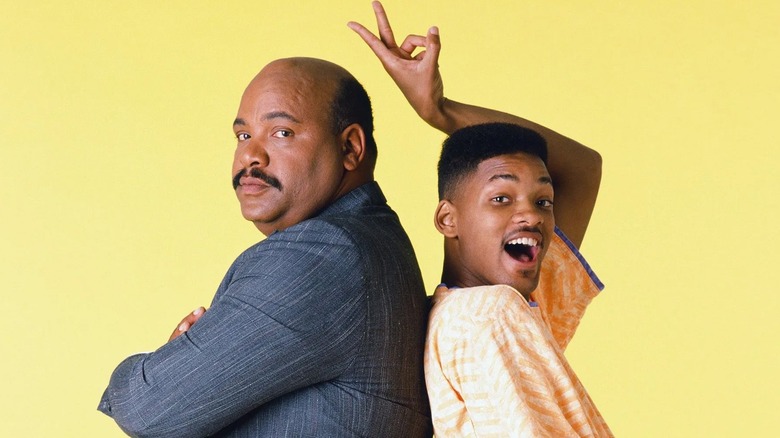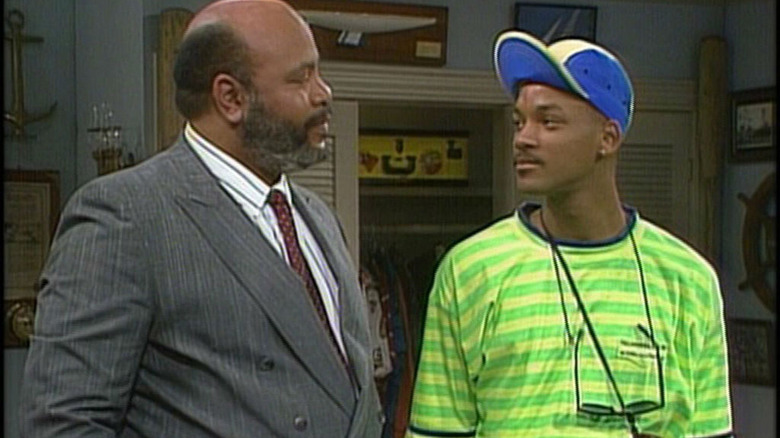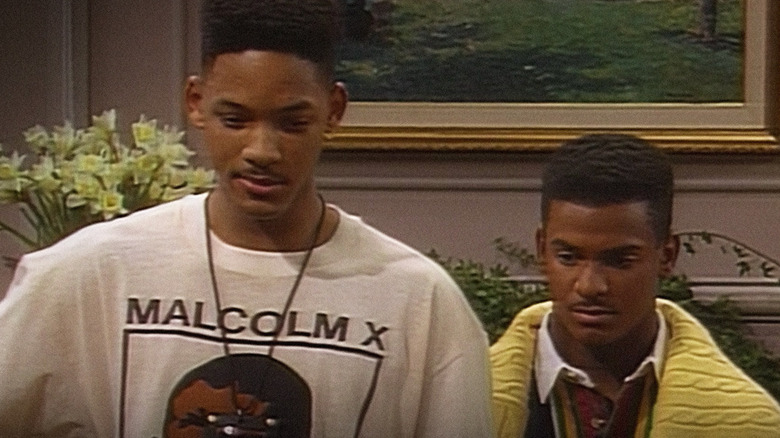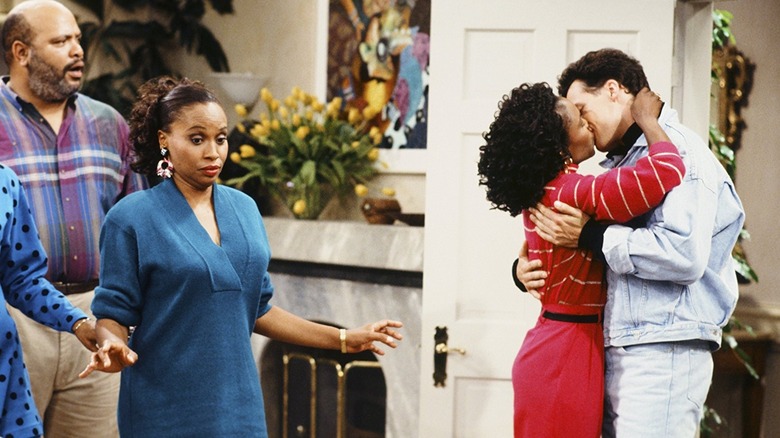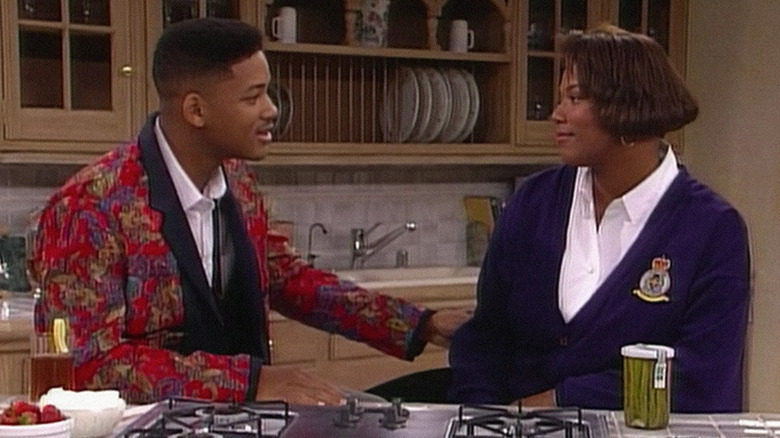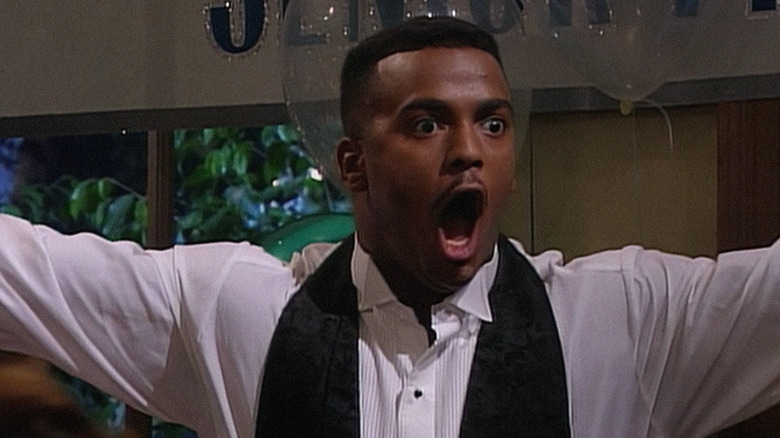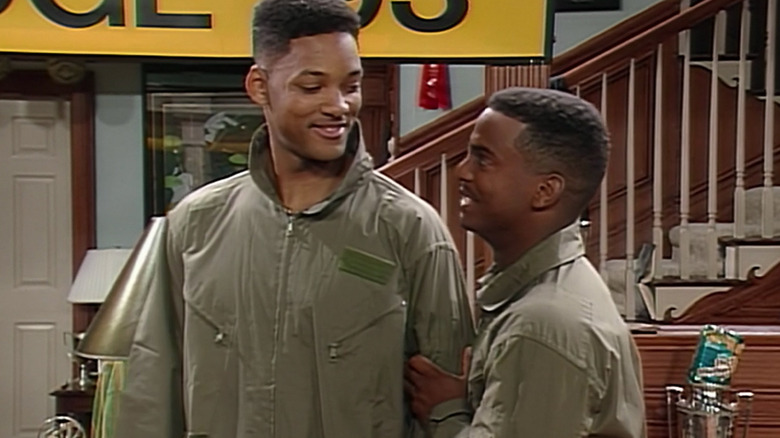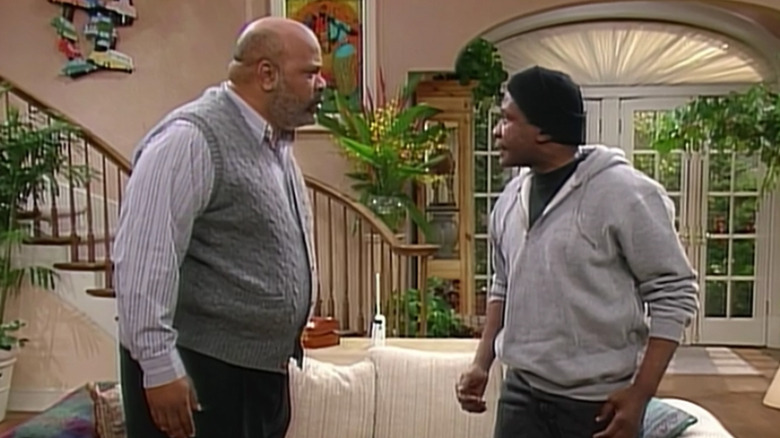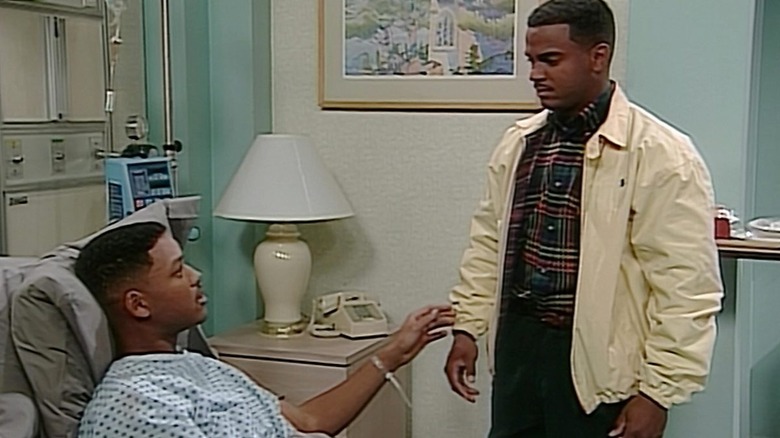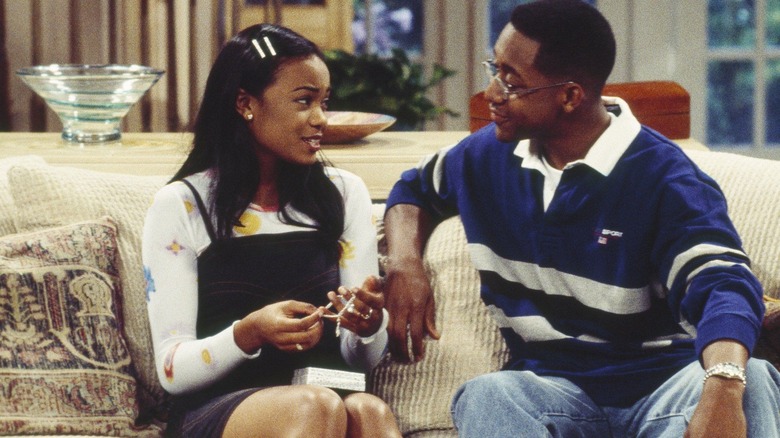The Fresh Prince Of Bel-Air Was Always A 'Serious' Show
Will Smith has landed in Bel-Air. No, not the original Fresh Prince, but Jabari Banks' new iteration of the character in the Peacock remake "Bel-Air." The series premiered last weekend, following a long journey that began in March 2019 with the release of filmmaker Morgan Cooper's four-minute "Bel-Air" fan film.
There's a niche sub-genre of parody trailers on YouTube, featuring clips of scenes from famous movies and using a combination of voiceover, title cards, and music to (for example) make "Frozen" look like a horror movie, or make "The Shining" look like a rom-com. After DC Comics' Clown Prince of Crime got his own gritty, edgy, Martin Scorsese-inspired "serious" solo movie in "Joker," it was quick to be parodied on "Saturday Night Live" with a trailer for "Grouch," a gritty, edgy, Martin Scorsese-inspired "serious" solo movie about "Sesame Street's" trashcan-dwelling pessimist Oscar the Grouch.
Unlike all of the above, however, "Bel-Air" wasn't made with the intent of mocking or parodying "The Fresh Prince of Bel-Air." Speaking in an interview with Looper, Morgan Cooper said that the fan film (which eventually became a TV show thanks to Will Smith's endorsement) was born out of genuine love for a series that had been important to him in his formative years:
"I grew up watching 'The Fresh Prince.' It's always been something that was a part of my life, my family's life, my friends — everybody I roll with, we love 'The Fresh Prince.' The vision hit me at once and said, "What if we grounded these characters that we know and love from the sitcom in modern day life in America? What would that look like?" The groundwork and the framework of that original story from the sitcom lends itself so well to a drama."
As Cooper observes, one of the reasons that "The Fresh Prince of Bel-Air" became so well-loved and such an important show for a generation of '90s kids was that its family bonds felt real, and the show didn't pull its punches in the moments when it did get dramatic. Though it's remembered for the colorful opening credits song, and for recurring visual gags like Carlton's signature dance and Jazz getting thrown out of Banks residence, "The Fresh Prince of Bel-Air" had no qualms about being a serious show — when it needed to be.
The Fresh Prince Project (Season 1, Episode 1)
From the very first episode, it's clear that "The Fresh Prince of Bel Air" isn't just going to be all laughs with no substance. Like many dramas and family-friendly sitcoms of the '90s, it made a point to touch on the social issues and experiences of the real world that many viewers lived in.
The initial misunderstanding between Will and Uncle Phil stemmed from tensions and misconceptions born of classism and ignoring the complexities of Black identity in favor of one-dimensional stereotypes. Will accuses Uncle Phil of being a "sellout" who forgot where he came from, while Uncle Phil (and Hilary and Carlton) regard Will with a dismissive disdain because of the image they believe he projects. In the end, they come to an understanding and realize they've misjudged one another.
Exploring the nuances of Blackness, and the differences between how society perceives us and who we really are, would go on to be a recurring theme throughout "The Fresh Prince of Bel-Air." It remains a reflection of what is still an ongoing issue in a society that is obsessed with forcing people — especially people of color — into narrow lanes, trying to package cultural identity into easily defined and limited categories. (Deshawn "DeLa Doll" Thomas)
The Ethnic Tip (Season 1, Episode 17)
"Fresh Prince" wasted absolutely no time in establishing Will's M.O. Will was always a trickster who preferred the easy way out, especially in earlier seasons. But the series never shied away from teaching Will hard lessons, and it's the reason his arc is one of the best in sitcom history.
One of Will's bigger lessons begins in season 1 with "The Ethnic Tip." Will is finally starting to find his rhythm in Bel-Air, and at his new school. Though he's able to charm his way out of tardy notices thanks to his rapport with his History teacher (who also moonlights as his basketball coach), Will is still flunking the class. But he insists that his bad grades are just a product of disinterest: if the curriculum told "the whole story" about Black history — instead of relying solely on a eurocentric perspective — he'd probably work harder.
This scheme works a little too well, though, and Will accidentally sets up his Aunt Viv with a one-month stint teaching Black history to his class. At first, he and Carlton think they've got it made. Not only are they related to their new teacher, they're the only Black students in the class. Surely their own personal knowledge of the Black experience will allow them to coast through the course with flying colors, right?
Wrong. Aunt Viv pushes Will and Carlton harder than their white classmates — who, ironically, are more enthusiastic than they'll ever be about learning Negro Spirituals. But she's only so hard on them because she sees the cracks in their facade: even if Will has read "The Autobiography of Malcolm X" more than once, it doesn't mean he's really serious about Black history. "You can read that book," Aunt Viv tells him. "You can wear the T-shirts, you can put up the posters and you can shout the slogans, but unless you know all the history behind it, you're trivializing the entire struggle."
"The Ethnic Tip" was one of the first "Fresh Prince" episodes that addressed the commodification of figures like Malcolm X and the Black Panthers, but it's a topic that the show continued to focus on throughout its six seasons on-air. (Lyvie Scott)
Guess Who's Coming to Marry (Season 2, Episode 6)
In this episode (whose title is a nod to its role reversal of the 1967 film "Guess Who's Coming to Dinner"), Will's Aunt Janice introduces the family to her fiance just one day before the wedding. To the surprise of everyone, Frank, her fiance, is a white guy. Interracial dating is still a touchy subject in 2022, let alone in 1991 when the episode first aired. The reactions to Frank are mixed. Most of the family expresses shock and even discomfort, but Will's mother has the strongest and least ambiguous initial reaction of all – absolute rejection, even going so far as to ban Will from attending the wedding.
Later that night, the aunts and Will's mother all end up speaking in the kitchen as a result of not being able to sleep due to anxiety surrounding the wedding. They share their thoughts on interracial dating, with Aunt Helen (played by the marvelous Jennifer Lewis) stating that you can't help who you fall in love with, offering her sister support. Will's mother, Vy, joins them and offers a sobering take on the matter, with the following monologue:
"Don't you have enough problems being an African-American woman? You need a white husband to further complicate things? What about Frank? This isn't gonna make his life any easier. Have you thought about that? You thought about your children, or the jobs or friends you may lose when some bigot fails to see the beauty in your marriage? Honey, I did not make the rules, but I know how to play the game. For survival, Janice, please don't marry this man."
While unsupportive, it becomes clear that Vy was trying to protect her sister in her own way. It wasn't that she didn't approve of Frank, but rather that she feared the relationship would open Janice up to a host of new problems and challenges. I wish I could say her fears were unfounded, but due to personal experience, I know they're not. Uncomfortable conversations, crude remarks, invasive questions, staring, unfair assumptions, and even outright hostility (from strangers and loved ones alike) are all very common parts of reality for people in interracial relationships, especially when you're a woman of color, and especially when you're a Black woman. This doesn't mean such relationships shouldn't happen, but it's important to acknowledge they come with unique challenges.
At the time the episode aired, interracial marriage had only been made legal at a federal level just 24 years priors with the Loving v. Virginia decision in 1967, which ruled that laws banning interracial marriages were unconstitutional. It's not difficult to understand Vy's apprehension, but she does come around thanks to Will's insistence on supporting his Aunt and attending the wedding. He gives her a touching reality check about how love doesn't come with total control or submission, and that people are allowed to make their own choices no matter how we may personally feel about them. (Deshawn "DeLa Doll" Thomas)
She Ain't Heavy (Season 2, Episode 8)
There was scarcely a time, over the course of six seasons, that Will was without a romantic interest on "Fresh Prince." Will never had the best luck with the girlies, but he did have a consistent type. Will's girlfriends were often played by the most beautiful Black women in Hollywood; sometimes even supermodels — before Tyra Banks' Jackie Ames, there was Naomi Campbell. So it's kind of a surprise when Will falls for Dee Dee Richards (Queen Latifah), the complete opposite of the girl he typically chases.
Of course, Will puts up a hell of a fight when he first meets Dee Dee. He's got a clear aversion to any girl above the coveted size 2, and has never thought twice about telling a joke at Uncle Phil's expense. But Dee Dee actually turns out to be a better match for Will than he thought. They both love Blaxploitation flicks, the Lakers, and sticking straws up their noses to get a quick laugh. Unfortunately, Will's a bit too concerned with what others think of their friendship. He doesn't even defend Dee Dee when his friends make fun of her.
Though Dee Dee didn't return for a longer arc, her relationship with Will brought a new perspective to "Fresh Prince." Will went on to continue his streak as a ladies' man, but not without first confronting his prejudices head-on. In turn, "She Ain't Heavy" made an unflinching statement about size discrimination before words like "bodyshaming" and "fatphobia" had even entered the public conscious. (Lyvie Scott)
Just Say Yo (Season 3, Episode 19)
In the '80s and '90s you could usually smell a "very special episode" from a mile away. They could feel out of place in a notoriously-lighthearted sitcom on their premise alone, which usually focused on "tough" issues like drug use, sex education or mental health. Not even "Fresh Prince" was immune to a special episode or two, but "Just Say Yo" proved that the series could touch on controversial themes without falling into preachy territory.
This very special episode gets off to an unobtrusive start: the senior prom is fast approaching, and though Will and Carlton both have dates secured, they each still have problems of their own. Carlton is battling a massive pimple (remember when pimples were the end of the world?), and Will is so busy with extracurriculars that he hasn't been able to get the rest he needs. Will's constant yawning provides the perfect opportunity for a shady classmate to approach him with amphetamines — and though he doesn't succumb to the temptation of taking any, Carlton accidentally does.
What makes "Just Say Yo" genuinely good is its portrayal of Will and Carlton's relationship. Though Carlton did find the drugs in Will's locker, he keeps that detail to himself, even when Uncle Phil and Aunt Viv berate him for taking the mystery drugs in the first place. He's determined to protect Will from the same treatment. But this starts to eat away at Will, not because it could have ruined Carlton's image, or even sent him down a "dark path" — but because his carelessness could have seriously hurt a person he loves. (Lyvie Scott)
Blood Is Thicker Than Mud (Season 4, Episode 8)
I've never really understood the purpose of Greek life in college. Sure, you get a family for life, but what about all you have to sacrifice to get it? Hell Week seems a lot like school-sanctioned bullying; those who are hazed eventually turn around and haze the next generation. I've seen my share of horror stories; the Netflix film "Burning Sands" is an especially bleak look at Greek life in an HBCU. "Blood Is Thicker Than Mud" also touches on the pitfalls of fraternity culture, but it does so with a fair amount of "Fresh Prince" goofiness — all while serving up one of Carlton's strongest storylines.
In season 4 of "French Prince," Carlton and Will are college freshmen. For Carlton, college success is synonymous with rushing a fraternity (How else will he pad his resume for Princeton?) Though he initially leans toward the frats filled with rich (and mostly white) pledges, Will has a connection to Phi Beta Gamma, an all-black fraternity complete with their own show-stopping step routine. Will, for all his hangups with Greek life, pledges with Carlton, but Gamma leader Top Dog only makes life hell for the latter.
Carlton takes the hazing in stride — and it helps that Hell Week plays out in a quirky montage — but after the dust settles, only Will is selected to join the Gammas. Carlton, however, isn't "enough of a brother to be a brother." Top Dog, for all his assertions about unity, is majorly put-off by Carlton's wealth and status. Alfonso Ribeiro portrays Carlton in top form, especially when confronting Top Dog for his prejudices. The episode is a surprisingly-sharp commentary on the disparities that still plague the Black community, and how intersectionality is just as important for marginalized groups as it is for society as a whole. (Lyvie Scott)
Papa's Got a Brand New Excuse (Season 4, Episode 24)
"How come he don't want me, man?" It's a line that has become one of the most recognizable moments from the show. It's what made "Papa's Got a Brand New Excuse" the most popular (and profound) episode of "The Fresh Prince of Bel-Air." And rightfully so: it's a perfect example of the narrative threads that the series was never shy about addressing.
In season 4, Will's father Lou comes back into his life after 14 years of radio silence. Will puts on a brave face and tries to reconnect with his dad. He's ready to forgive Lou for abandoning him (and his mother), but not everyone shares that sentiment — least of all Uncle Phil. Tensions build at the Banks residence once Will and Lou actually start to bond. He comes clean about his mistakes and insists he's ready to do right by Will. He even offers to take his son on a cross-country trip over the summer.
Only Uncle Phil sees through Lou's lies, but he's not exactly delicate about helping Will manage his expectations. Will, like any kid with a deadbeat parent, wants to believe his dad has changed more than he actually has. Which is why, when Lou abandons him for the second time, he can no longer smile and pretend everything is fine. Will (Smith, that is) delivers a heartbreaking monologue denouncing his father to Uncle Phil. At first it all feels like bravado — "I didn't need him then, and I don't need him now" — but before long Will is crying, Uncle Phil is crying ... even the audience is crying (you can actually hear sobs at the end of the scene).
"Papa's Got a Brand New Excuse" does great work in cementing Phil as Will's real father figure. It reminds us how consistently Phil has been there for him, even amidst constant fights and disagreements. But it all works because of Smith's monologue. The actors' commitment to the scene made it one of the most touching moments in TV history, and one that people still rank highly today. (Lyvie Scott)
Bullets Over Bel-Air (Season 5, Episode 15)
We all remember the episode when Will gets shot. He pushes Carlton out of harm's way when they're mugged at the ATM, resulting in his (Will's) own hospitalization and Carlton being understandably shaken by the entire ordeal. He's so shaken, in fact, that he buys a gun, telling Will that he intends to use it for self defense. Will urges Carlton to reconsider, and then breaks down in crying after he successfully convinces Carlton to disabuse himself of the notion that he can pull off being a gun-toting vigilante. The episode's attempt to address the still-ongoing issue of gun violence in America is admirable, and just one example of how "The Fresh Prince of Bel-Air" tackled topical episodes that remain relevant even decades later. (Deshawn "DeLa Doll" Thomas)
Not With My Cousin You Don't (Season 6, Episode 7)
In this episode of "The Fresh Prince of Bel-Air," Hilary gives Ashley surprisingly progressive guidance concerning her blossoming sexual awakening. At a time when fearmongering and abstinence-only sex education were the standard, and the media was dominated by slut-shaming narratives that simultaneously obsessed over and reviled women who were caught up in invasive sex scandals while mostly absolving the men involved, Hilary's empowering, sex-positive advice to her little sister about how her decision to have sex for the first time should be entirely her own. She also adds that she's always there to support Ashley, stating, "For as long as I can remember you have been independent, responsible and smart. I know you're aware of all the issues, and whatever decision you do make, I'm always here for you."
This exchange is especially poignant juxtaposed against the antics of Will and Carlton, who spend the episode effectively infantilizing and cock-blocking Ashley (they went through a similar panic when Ashley first became curious about sex in the season 2 episode "Be My Baby Tonight"). Will does end up apologizing to Ashley, which is pretty cool of him. (Deshawn "DeLa Doll" Thomas)
